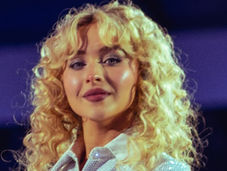The Last Dinner Party at Rough Trade East
- Mali Jones
- Mar 13, 2024
- 3 min read

Photo available via Flickr (Under License Attribution-NonCommercial-NoDerivs (CC BY-NC-ND 2.0))
On a gloomy Saturday in mid-February, my friend and I arrive at the destination of our chosen night out: Brick Lane’s ‘Rough Trade East’, to watch and meet one of Britain’s most exciting new bands.
As the campy, and classical notes of the album’s titular track ‘Prelude to Ecstasy’ emerge from small venue speakers, the band’s intentions are clear. You realise The Last Dinner Party’s presentation can be read as a rebellion, and indeed rejection of the nonchalant ‘blasé’ attitudes of their more post-punk leaning peers, frills and bows contrasting the band t -shirts and ripped jeans of the indie sleaze; revelling in all that is camp and pretentious, yet remaining refreshingly relatable and real.
In this same vein, lead singer Abigail Morris later notes that Rough Trade East’s stage doesn’t offer, ‘enough space to twirl’, confirming that The Last Dinner Party is inherently different than your typical band: not only a concert but an experience.
Despite the confined walls and small stage space of Rough Trade East, the group’s fondness for theatrics remains constant; as ultimately, The Last Dinner Party function best as a live band. It’s one thing to listen to ‘Prelude to Ecstasy’ during your morning commute, yet being able to see the quintet live manifests itself as otherworldly, with their more maximalist approach feeling like a breath of fresh air.
Like any ex-drama a level student, I hold a certain fondness for the dramatic and pretentious, something which is unapologetically championed throughout ‘Prelude to Ecstasy’.
Theatrics are notably present due to the band’s rootedness in all that is classical (with the band’s keyboardist Auora Nishevci having attended the Guildhall School of Music and Drama and working as a classical composer) expertly positioned alongside an identity which feels distinctly modern. The Last Dinner Party is a band almost impossible to place, impossible to distinctly define.
The queuing (which lasted longer than the band’s actual performance) notably wrapped its way around the whole record shop, an impressive feat for a band’s debut album.
I had absentmindedly brought my KCL ResLife bag, thinking nothing of it. Yet, when stood sheepishly in front of band’s lead singer, Morris excitedly exclaims “KCL! That’s where we met! in freshers’ week!” I wish I’d done something so productive in freshers' week. Imagine forming a Brit-award winning, genre defying band as opposed to spending way too much money on terrible Jaegar-bomb shots in London’s dingiest student-infested clubs.
After speaking briefly, I discovered we shared the same degree, going to show that an English degree is indeed the perfect degree for a rockstar. Morris’ ‘stay in school!’ sprawled on my copy of the record now remains a prized possession within the confines of my dorm, perhaps as some deluded form of motivation.
I first had the privilege of seeing the last dinner party this summer in Oxfordshire’s Truck Festival, and despite being packed into a tiny tent, drenched in mud and just about functioning on three hours of sleep; the quintet has the distinct, and in my opinion, rare, ability to transport audiences to somewhere far, somewhere transcendent.
As unpretentiously as possible, when watching Morris parade around that very stage, one felt as if they were witnessing the beginning of something important, something new and incredibly needed.
The band’s key influences are eclectic and palpable as they capture the indie-whimsy of Florence Welch and choir-like harmonies of ABBA.
Yet, these more modern influences exist alongside the band’s references to the incredibly classical and literary, such as the album’s recurring themes of fluidity and queerness reminiscent of Virginia Woolf’s Orlando (cited as the band’s unanimous favourite book!)
The Last Dinner Party thrive within these binary opposites, constantly doing whatever is unexpected of them. This is distinctly notable within one of the album’s stand-out tracks ‘Caesar on a TV Screen’. This song is an adaptation of Shakespeare’s Julius Caesar, showcasing the band’s distinct ability to marry the modern and ancient, giving voice to every girl’s secret, innate desire to occupy the same position of power as Shakespeare’s most prominent tyrannous dictators.
Perhaps the band’s inherent eclectic aura behaves as explanation for their success and ability to resonate with so many, as the balance between pompousness and gritty realism ultimately gives voice to complex human desires and feelings within their music.
Edited by Lucy Blackmur, Music Editor
























Comments